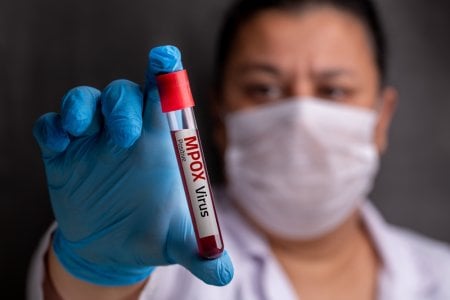Thailand confirms case of new mpox strain spreading from Africa
By
Seia Ibanez
- Replies 38
As we navigate the ever-changing global health landscape, a new concern has emerged.
Thailand has recently confirmed a case of mpox, specifically the clade 1b strain, which is currently spreading in parts of Africa.
This development has raised alarm bells worldwide, as it marks only the second confirmed case of this variant outside the African continent.
The individual at the centre of this case is a 66-year-old man from a European country who had recently arrived in Thailand from an unspecified African nation where the disease is prevalent.
According to Thongchai Keeratihattayakorn, the director-general of Thailand's Department of Disease Control, ‘The test results confirm he is infected with the clade 1b strain of monkeypox, which is the first case diagnosed in Thailand, but this man is likely infected from an endemic country.’
Mpox is a viral disease similar to smallpox, though typically less severe. It can spread through close contact, including direct contact with the infectious rash, scabs, or bodily fluids, respiratory droplets during prolonged face-to-face contact, and contaminated materials such as bedding.
The clade 1b strain, particularly, has sparked global concern due to its apparent ease of transmission through routine close contact.
The situation is being taken very seriously by health authorities worldwide.
The World Health Organisation (WHO) has declared the recent outbreak of the disease a public health emergency of international concern after the new variant was identified.
In response to the confirmed case, Thai authorities have conducted contact tracing but have not detected other local infections.
The patient had also transited through a Middle Eastern country before arriving in Thailand, although the specific country has not been named.
While Thailand has detected 800 cases of mpox clade 2 since 2022, this is the first instance of clade 1 or clade 1b variants being identified in the country.
Meanwhile, Singapore's health ministry has reported 13 cases of mpox clade 2 infections this year, all of which have been described as 'less severe' clade 2 infections.
As a precautionary measure, Singapore will begin screening the temperatures of travelers arriving at Changi and Seletar airports from areas with a risk of mpox outbreaks starting Friday.
This is part of the government's efforts to monitor the global situation and protect public health closely.

Have you altered your travel plans due to the recent mpox cases? How do you stay informed and prepared for such health concerns? Let us know in the comments below!
Thailand has recently confirmed a case of mpox, specifically the clade 1b strain, which is currently spreading in parts of Africa.
This development has raised alarm bells worldwide, as it marks only the second confirmed case of this variant outside the African continent.
The individual at the centre of this case is a 66-year-old man from a European country who had recently arrived in Thailand from an unspecified African nation where the disease is prevalent.
According to Thongchai Keeratihattayakorn, the director-general of Thailand's Department of Disease Control, ‘The test results confirm he is infected with the clade 1b strain of monkeypox, which is the first case diagnosed in Thailand, but this man is likely infected from an endemic country.’
Mpox is a viral disease similar to smallpox, though typically less severe. It can spread through close contact, including direct contact with the infectious rash, scabs, or bodily fluids, respiratory droplets during prolonged face-to-face contact, and contaminated materials such as bedding.
The clade 1b strain, particularly, has sparked global concern due to its apparent ease of transmission through routine close contact.
The situation is being taken very seriously by health authorities worldwide.
The World Health Organisation (WHO) has declared the recent outbreak of the disease a public health emergency of international concern after the new variant was identified.
In response to the confirmed case, Thai authorities have conducted contact tracing but have not detected other local infections.
The patient had also transited through a Middle Eastern country before arriving in Thailand, although the specific country has not been named.
While Thailand has detected 800 cases of mpox clade 2 since 2022, this is the first instance of clade 1 or clade 1b variants being identified in the country.
Meanwhile, Singapore's health ministry has reported 13 cases of mpox clade 2 infections this year, all of which have been described as 'less severe' clade 2 infections.
As a precautionary measure, Singapore will begin screening the temperatures of travelers arriving at Changi and Seletar airports from areas with a risk of mpox outbreaks starting Friday.
This is part of the government's efforts to monitor the global situation and protect public health closely.
Key Takeaways
- Thailand has confirmed a case of the mpox clade 1b strain, marking the second confirmed case of the variant outside Africa.
- The infected individual is a 66-year-old European man who travelled from an African country where the disease is spreading.
- The World Health Organisation has declared the recent outbreak a public health emergency of international concern.
- Thai authorities are being vigilant, having already detected 800 cases of mpox clade 2, and are now monitoring the global situation closely.








